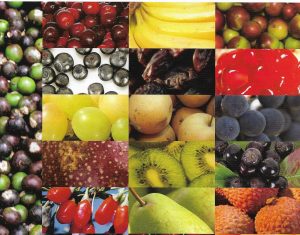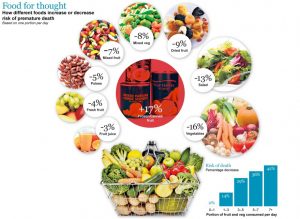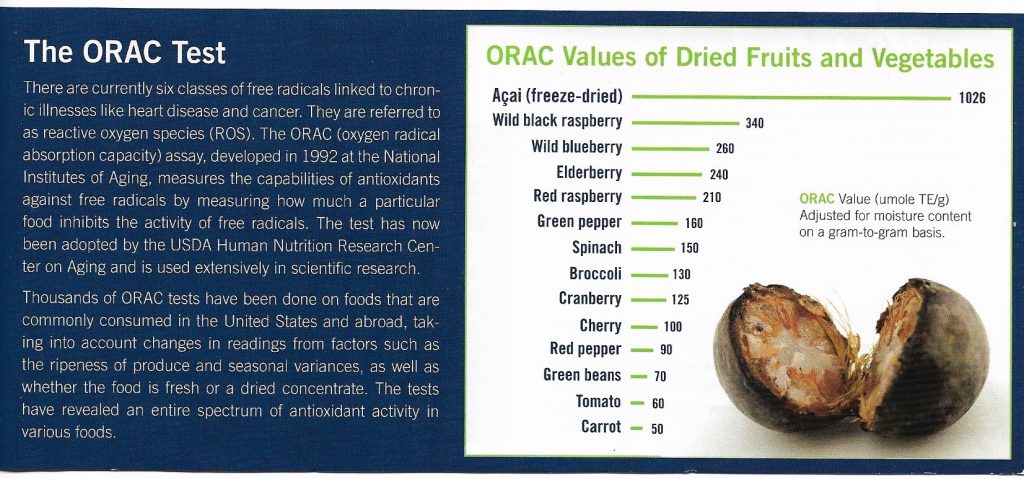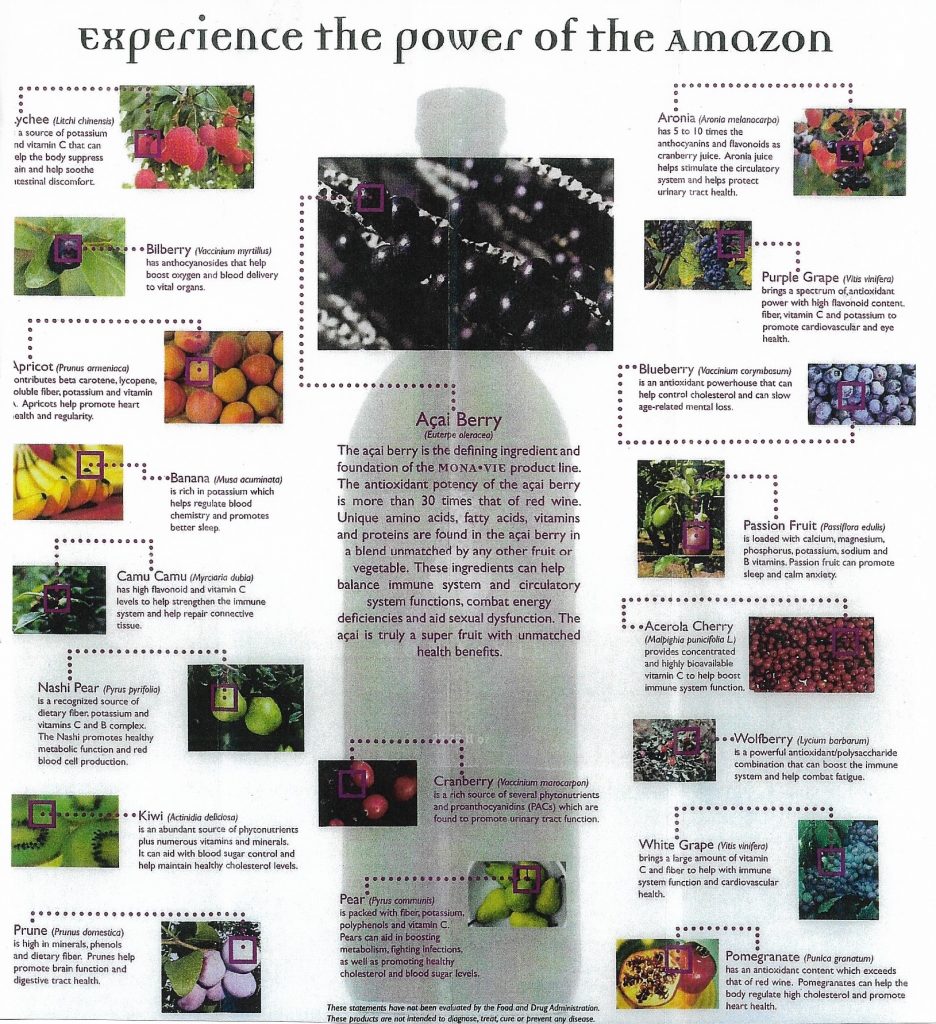19 Superfruits for Better Health!
All of the 19 fruits discussed in this blog have enjoyed centuries of traditional use, are high in antioxidants, and are supported by modern science. The majority of physicians and health professionals believe there are a clear association and proof between a diet high in fruit and a lowered risk of several chronic diseases.
The largest and longest study to date was done as part of the Harvard-based Nurses Health Study and Health professionals follow-up Study.
If followed the health and dietary habits of almost 110,000 men and women, and found that the higher the average daily intake of fruits, the lower the chances of developing cardiovascular disease.
In order for a person to stay healthy, we should consume at least 13 servings of fruits and vegetables a day (depending on age, gender, physical activity, and overall health) which, for most people is not feasible.
A liquid juice that contains these 19 fruits would be the best bet in order to intake the number of nutrients contained in 13 servings of fruit and vegetables.
 Here is the list of the most valuable 19 fruits on Earth
Here is the list of the most valuable 19 fruits on Earth
AÇAY BERRY
Whether used in beverages for instant energy, as an aid for the sexual disorder, or for aiding numerous other ailments, the açai berry has been used by modern and ancient inhabitants of the Amazon rainforests for centuries.
With a protein profile similar to eggs, monounsaturated fat, and polyunsaturated fat ratio nearly identical to olive oil, nearly 20 phytonutrients and a blood-sugar-friendly glycemic index, the açai is a remarkable food.
It contains several potent antioxidants, is packed with polyphenols (potent plant antioxidants), and boasts up to 30 times the anthocyanin content of red wine. Additionally, the açai berry is loaded with vitamins, especially vitamin E and trace minerals including copper, iron, and calcium.
Açai is one of the most nutritious and powerful foods of the world, hidden within its royal purple pigment is the magic that makes it nature’s perfect energy fruit.
Nutritional Highlights
°Polyphenol
°Anthocyanins
°Essential Fats
°Vitamin E
°Minearls
Can Help
Sexual dysfunction
°Energy deficiencies
°Immune problems
°Circulatory conditions
CAMU-CAMU
Is a purple-skinned fruit native to Peru with a diverse nutritional profile?
Nutritional Highlights
°Potassium
°Flavonoids
°C Vitamins
°Amino acids
CAN HELP
°Mood disorders
°Immune function
°Viral and bacterial infection
PEAR
The common European pear is packed with a variety of nutrients, including dietary fiber, potassium, vitamin C, and several polyphenols. Research suggests that pears may be able to help normalize blood sugar levels, boost metabolism, and provide a variety of other health benefits.
Nutritional Highlights
°Potassium
°Dietary fiber
°Vitamin C
Can Help
°Gastrointestinal health
°Blood glucose/diabetic conditions
CRANBERRY
Cranberries are far more than a Thanksgiving side dish! The tart berry is now commonly recommended even by doctors for urinary tract infections. In fact, a recent study showed its effectiveness in reducing E.coli bacteria in urine at twice the levels of the placebo. Cranberries are very high in vitamin C and proanthocyanins, both of which are powerful antioxidants.
Nutritional Highlights
°Vitamin C
°Various polyphenols
Can Help
°Urniary tract infections
°High cholesterol
°Antioxidant protection
PRUNES
Plums process impressive antioxidant properties, but when converted into prunes their antioxidant content increases by up to 600 percent!
Nutritional Highlights
°Vitamins
°Anthoyanins
°Minerals
Can Help
°Aging-related conditions
PURPLE GRAPES
Grapes contain resveratrol. the potent antioxidant found in red wine and other grape products. The high flavonoid content of purple grape juice can protect the body from cardiovascular disease.
Nutritional Highlights
°Resveratrol
°Flavonoids
°Proanthoyanins
Can Help
°Aging
°Cardiovascular problems
°Eye problems
BANANA
The high fibered fruit contains no fat, sodium or cholesterol, and it’s a great source of potassium, vitamin B6, vitamin C, and magnesium.
Nutritional Highlights
°Potassium
°B vitamins
Can Help
°Sleep and nervous system health
°Blood cell health
NASHI PEAR
The pear originates in Asia, where it has been cultivated for thousands of years. Modern science suggests that it’s antioxidant and phytonutrient profile may help with heart disease. It’s useful in treating digestive and urinary problems including constipation, because of its cleansing effects.
Nutritional Highlights
°Dietary fiber
°B vitamins
°Vitamin C
Can Help
°Red blood cell production
°Gastrointestinal health
WOLFBERRY
LYCIUM BARBARUM POLYSACCHARIDE, (LBP)enables wolfberry to protect and repair cellular DNA. Wolfberry also provides 18 amino acids and 21 trace minerals. like açai, wolfberry is also known for aiding sexual health.
Nutritional Highlights
°LBP
°Amino Acids
°Minearls
°Vitamins
Can Help
°Damaged DNA
°Sexual Dysfunction
POMEGRANATE
Studies show that pomegranate juice is one of nature’s most powerful antioxidants, containing an extremely high level of polyphenols and other free-radical-fighting agents.
Nutritional Highlights
°Polyphenols
°Vitamins
°Anthocyanins
Can Help
°Arterioclerosis
°Heart Disease
°Diabetes
WHITE GRAPES
Like purple grapes, white grapes are a great source of antioxidants, especially vitamin C. It is also a great source of dietary fiber, which can help protect against heart disease and gastrointestinal complaints.
Nutritional Highlights
°Vitamin C
°Dietary fiber
Can Help
°gastrointestinal health
°Antoxidant protection
ARONIA BERRY
The Aronia berry contains high amounts of proanthocyanins and quinic acid (ten times more than cranberries). Quinic acid prevents urinary infection.
Nutritional Highlights
°Polyphenols
°Anthoyanins
°Quinic acid
°Vitamins
°Minearls
°Favonois
Can Help
°Inflammation
°Diabetes
°Circulatory problems
APRICOTS
Apricots, with their brightly pigmented, velvety-orange skin, are packed with vitamins, minerals, and dietary fiber. These nutrients contribute to the overall health and protection of the heart and eye.
Nutritional Highlights
°beta-carotene and vitamin A
°Vitamin C
°Potassium
°Fiber
Can Help
°Eye problems
°Heart disease
°Stroke
LYCHEE FRUIT
This tropical fruit from South China is popular all over the world as a culinary treat, but its health benefits are also impressive. The low-calorie fruit has more vitamin C than citrus fruits, as much fiber as an apple and potassium levels comparable to a banana.
Nutritional Highlights
°Potassium
°Vitamin C
°Dietary fiber
Can Help
°Gastrointestinal health
°Overall wellness
BLUEBERRY
Blueberries consistently rank very high in antioxidant activity when compared to other fresh fruits and vegetables. Blueberry’s anthocyanins are the chemicals responsible for its antioxidant and anti-inflammatory properties and are linked to numerous health benefits.
Nutritional Highlights
°Anthocyanins
°Vitamins
°Minerals
Can Help
°Heart Disease
°Memory loss
°Urinary Tract Infections
BILBERRY
Bilberry studies indicate that bilberry, with its abundance of antioxidants, may be effective in protecting the body against carcinogens, free radicals, and linked to eye health.
Nutritional Highlights
°Flavonoids
°Anthocyanins
°Resveratrol
Can Help
°eye problems
°Arthritis
°Heart Attack and Stroke
°Diabetes
°Diarrhea and dysentery
KIWI FRUIT
Researchers are fascinated by the kiwi’s ability to literally protect cell DNA from oxidant-related damaged and protection and cardiovascular health. Kiwifruit also provides ample amounts of vitamin A, vitamin C, trace minerals, and dietary fiber.
Nutritional Highlights
°Vitamins
°Minerals
°Fiber
Can Help
°DNA damage
°Eye problems
°Cardivascular conditions
ACEROLA CHERRY
Modern research suggests it does possess both anti-inflammatory and astringent properties, which would explain its use for dysentery. It is rich in several nutrients, especially vitamin C.Over 150 phytonutrients have been identified in the acerola cherry.
Nutritional Highlights
°Vitamin C
°Potassium, magnesium and other minerals
Can Help
°Immune function
°dysentery and diarrhea
PASSION FRUIT
Passion fruit is recognized as a remedy for anxiety, depression, and sleep disorders. It is also used in traditional medicine for urinary tract infections. Vitamin C, potassium, and other relaxing agents may also help asthma or spasmodic coughing conditions.
Nutritional Highlights
°Vitamins
°Minerals
°Fiber
Can Help
°Urinary Tract Infection
°Anxiety
°Insomnia
